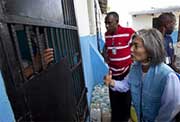UN High Commissioner for Human Rights
 “Eighteen months after the January 2010 earthquake, the massive destruction that has affected Port-au-Prince and other cities in Haiti is still very visible,” said UN Deputy High Commissioner for Human Rights, Kyung-wha Kang, at the end of a five-day mission to Haiti. “We cannot expect the humanitarian response to provide solutions to complex human rights issues that have prevailed in Haiti for such a long time.”
“Eighteen months after the January 2010 earthquake, the massive destruction that has affected Port-au-Prince and other cities in Haiti is still very visible,” said UN Deputy High Commissioner for Human Rights, Kyung-wha Kang, at the end of a five-day mission to Haiti. “We cannot expect the humanitarian response to provide solutions to complex human rights issues that have prevailed in Haiti for such a long time.”
In the aftermath of last year’s earthquake and the April 2011 tornado, it is estimated that 680,000 Haitians live in camps within and on the outskirts of affected cities, where humanitarian agencies have pulled out due to lack of funding and where conditions continue to deteriorate. One of the main concerns of the UN Human Rights office is that, in the reconstruction process, little emphasis has been put on the protection and promotion of human rights. The realization of economic and social rights is key to long-term stability in Haiti, Kang noted, and only a comprehensive housing plan combined with major job creation can break the cycle of extreme poverty in which Haiti has been trapped for many years.
“President Martelly’s strong and sustained leadership on human rights is central to addressing systemic failings in the rule of law and providing solid progress on economic development and reconstruction efforts,” she said.
After having visited the border area at Ouanaminthe and observing the total impunity with which human trafficking takes place, the Deputy High Commissioner made an urgent call for greater resources to be devoted to the protection of children. She urged the parliament to give high priority to tightening laws so that incidents of human trafficking can be investigated and the traffickers held legally responsible.
Kang also called for action on key aspects of rule of law reform, including the vetting of the police, improving conditions of detention and diminishing the duration of pre-trial detention, and the appointment of a President of the Cour de Cassation (Supreme Court). “In Fort Liberté, I visited the prison and holding cells in the police station, where inmates have an average living space of just 0.6 square meters. The crowded and degrading conditions, the very poor sanitary facilities, and insufficient nutrition and access to medical services were shocking,” Kang said. “That 60% of inmates have been in pre-trial detention, some for years, is also of serious concern. That minors, some as young as 13 years old, are held in prisons, against provisions in Haitian laws, is unacceptable.”
Impunity for past violations remains a major problem in Haiti. In January, the UN High Commissioner for Human Rights, Navi Pillay, reminded the authorities of their obligation to investigate the serious human rights violations that took place during the rule of Jean Claude Duvalier, and for which no statute of limitations exists under international law. Kang reiterated Pillay’s offer of support and technical assistance.
“In addition to the trial, I fully support the initiative to establish a Truth Commission. I hope it will thoroughly examine this period of Haitian history as well as others, promote memory and reconciliation, and raise awareness of the need to protect and promote human rights, particularly among young persons”, she added.
Kang also raised the issue of the dire situation of women who, long before the earthquake, have been subjected to alarming levels of violence, including domestic violence and rape. She welcomed the existence of a national plan to combat domestic violence and encouraged State entities to increase their response to this grave human rights violation.
The Deputy High Commissioner acknowledged the courage and the resilience of Haitians. “The reconstruction effort, and indeed the new construction in places where it never existed before, is a Haitian effort to meet Haiti’s human rights responsibilities,” she said. “Let me reiterate what I said to President Martelly and the many others with whom I was privileged to meet: the UN and OHCHR are here to support the people of Haiti and their Government and to advocate for the realization of their human rights.”
6 July 2011
